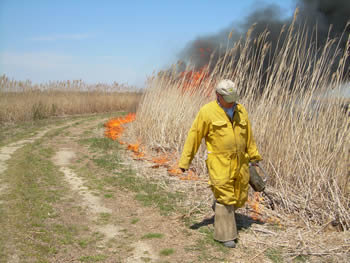A prescribed fire is the burning of undisturbed vegetation intentionally ignited to meet specific land management objectives such as wildlife habitat improvement, disease or invasive species control, forest management, fuel suppression, and other recognized conservation practices under such conditions that the fire is confined to a predetermined area.
Prescribed burns are preplanned ignitions with predetermined boundaries. They are only conducted under certain weather conditions (specific wind direction, moisture level, etc.) when flame length and heat can be controlled.
No one should attempt to conduct a prescribed burn until they have intensively studied burning and gained burning experience by assisting educated and experienced burn managers.
Applications and notifications required for burning in Delaware are managed through the DNREC ePermitting system, which offers online applications and allows users to manage their own portfolio of permits.

Prior to performing their burn plan, land managers must submit a prescribed burn application and receive approval from the DNREC Division of Air Quality. Application is made online through the DNREC ePermitting system.
An applicant must wait to burn until their application has been processed and approved. The applicant will receive authorization through email once written approval has been issued.
Those applying for prescribed burning approval must select a specific date for the burn as part of their application for prescribed burning. Applications without a date selected will not be processed or approved.
Applicants should enter a date convenient for them, allowing at least five to seven business days prior to the proposed burn date for processing. If the application is approved and the applicant has not started burning, the burn may be rescheduled for any reason, including weather conditions. The date can be changed by the applicant by logging in to the ePermitting system and updating the information before 11:59 p.m. on the approved burning date.
This can be done as often as needed to complete the burn. Failure to do so will require a new application and approval.
If the applicant has started burning and needs additional days to complete their burn, a new application and approval will be needed.
New Castle County
302-571-7331
Kent County
302-734-6040
Sussex County
302-856-6306
Burning is only allowed between 8 a.m. and 4 p.m. There is no limit to the amount of acreage that may be burned. However, the number of acres may be no more than what would be expected to burn within this time frame.
Before conducting a prescribed burn, those with written approvals must notify their local county fire board and submit their approval number.
Each written approval is issued for a specific day. All burning activity must cease by 4 p.m. on the approved day. If the applicant has started burning and needs additional days to complete their burn, a new application and approval will be needed.
Open burning is prohibited statewide during the ozone season, from May 1 through Sept. 30 each year.
Open burning is also prohibited on air quality action days when the State’s air quality has been forecast by the regional Air Quality Partnership (AQP) to be unhealthy. This includes days on which an approval may have already been granted. Forecasts are provided on this website and also by calling the Air Quality Partnership Information Line at 1-800-872-7261.
Check the forecast daily and take the proper actions to determine if an action day has been forecasted prohibiting open burning activity.
The Delaware State Fire Marshal may also issue a ban against open burning activity in individual counties or statewide.
The National Weather Service may issue a red flag warning against open burning activity due to unfavorable weather conditions that may result in dangerous fire conditions.
Anyone considering prescribed fire should first learn about fire behavior, fire and smoke management, burning laws, plant responses, animal needs, and animal responses.
Qualified burn managers include some farmers, forestry or wildlife agency personnel, state agricultural extension personnel, Nature Conservancy and Ducks Unlimited land management personnel, Natural Resources Conservation Service (NRCS) personnel, and County Conservation District wildlife or forage specialists.
Burns conducted for the following purposes, and those undertaken through the DNREC Tax Ditch Program, are considered agricultural burns:
Related Topics: air quality, burning, clean air, open burning